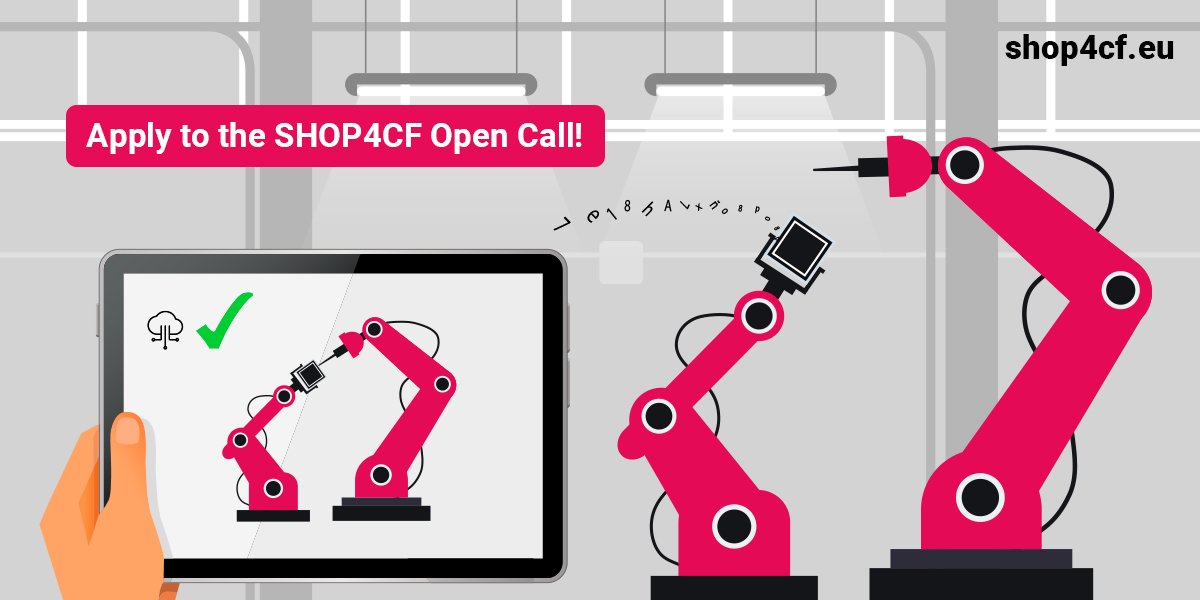Editor’s note: This is a sponsored article, which means it is independently written by our editorial team but financially supported by another organisation, in this case, SHOP4CF. If you would like to learn more about sponsored posts on Tech.eu, read this and contact us if you are interested in partnering with us.
This summer, SME-sized manufacturing companies and/or system integrators in Europe have a great chance to work on automating their processes, with both financial and know-how support from the EU. Under the project called SHOP4CF (Smart Human Oriented Platform for Connected Factories), a duo of a manufacturer and integrator can get €100,000 in grant money to introduce automation on the production floor using components developed by a number of industrial partners.
We looked at the project for the first time back in May, and wanted to dig a bit deeper to see how the technical side of the project works, what issues it's trying to solve, and how it aligns with a wider vision of the future of manufacturing in Europe.
GitHub for manufacturers
“Our innovation and value is that we are helping the system integrator to not develop a specific solution from scratch, but reuse our software components that he or she can download from our marketplace,” explained Noah Klarmann, researcher at TU Munich who works on the technical part of SHOP4CF.
The main idea of the project is to bring the great advances of the software development industry to the field of manufacturing, which has been historically slower to catch up with innovative models.
“Consider what happened to software development when GitHub was launched,” Klarmann said. “For example, in artificial intelligence, we are now reusing the libraries from Amazon and Facebook, we can build upon them instead of creating our own solutions from scratch.
“This leads to a higher degree of automation, because it's just more economically reasonable to reuse the components. We also know that 80 percent of the economic growth in the EU is based on productivity increase. And so, if we can find a solution that helps increasing this productivity by advancing the level of automation, that'd have a major impact on the field.”
Adoption of AI
One of the main goals for SHOP4CF is to increase the adoption of artificial intelligence and automation across the manufacturing industry.
On the more pragmatic and down-to-earth side, SMEs — unlike larger manufacturing players — rarely have resources and budgets to experiment with innovative processes that aren't guaranteed to bring tangible benefits. SHOP4CF solves this concern by offering ready-made and tested components that can be combined and integrated rapidly. One on hand, this approach increases the probability of successful adoption; on the other hand, it minimises the experimentation time and required resources.
Another — arguably much larger and more important — challenge is about people. Human operators on the production floor are used to working with programmable logic controllers (PLC) and aren't always happy to switch to more complex systems. Managers, in their turn, may not be ready to “trust the machine” in terms of decision making.
“We are moving away from explainable decision-making by humans to correlation-based decision making,” said Klarmann. “Often the decision is made by a neural network, and you can't understand the full reasoning. This is really the hard thing for the humans, from operators of PLC systems to C-level managers, to give up the responsibility to the system.”
The project also addresses the widespread fear of automation replacing humans all over the place, leaving operators out of their jobs.
“We are developing components that focus mostly on the collaboration with the human and in the production line,” Klarmann said. “We are seeing the human having a very special role in the factory of tomorrow, where all the aspects like creativity, adaptability, social and ethical skills come into play. We are building a system that focuses on human-centric production.”
To dig deeper into how automation for manufacturers may work, SHOP4CF is also working on a series of massive open online courses (MOOCs).
“We'll have two kinds of courses,” said Emily Carroll, head of public innovation programs at ISDI Accelerator. “First, there are business courses for C-level managers where they can learn how to digitise their manufacturing operations. Second, we're working on technical courses focused on SHOP4CF components that use real-life examples to tell about what's on offer and how to use it.”
Technically speaking
On the technical side of things, the components offered by SHOP4CF are provided as Docker containers that can be deployed and integrated with manufacturing operations using the FIWARE firmware. The vision of the project is to make the integration process as easy as possible, with a modular platform allowing for rapid testing and iteration.
This, however, doesn't mean that the success of SHOP4CF would make system integrators obsolete. On the contrary, by reducing complexity, it'd allow integrators to offer their customers a wider variety of solutions, including those that used to be beyond the reach of their expertise.
The call for applications from teams of manufacturers and system integrators is open until August 3rd, 2021. Do you have a project that fits the description? Fill out the official application to receive €100,000 in equity-free funding together with support from a group of researchers and practitioners with unparalleled experience in manufacturing.



Would you like to write the first comment?
Login to post comments